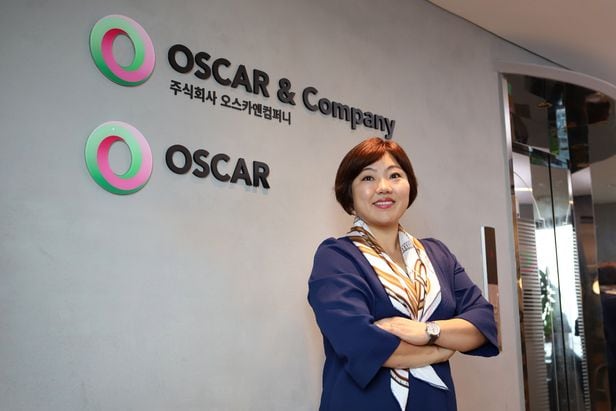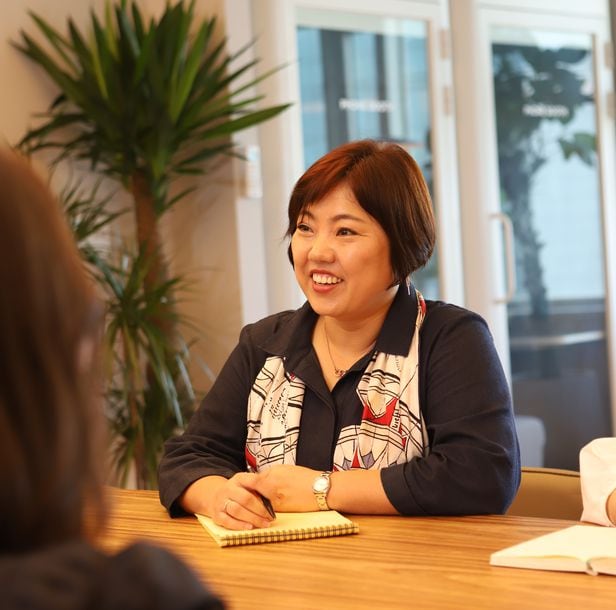Editor’s Note: As of the first quarter of this year, women account for only 6.3% of executives in the top 500 companies by revenue in South Korea. However, in the construction and real estate sectors, the figure is just 1.0%. Among the top 10 construction companies by construction capacity, many have no female executives, or only one or two. This reflects the perception that these industries are dominated by a male-centric culture. However, this is slowly changing. Though still rare, female executives and CEOs are beginning to make their mark, delivering results across the board. We spoke to some of them to understand their work and approach.
“When the market is as volatile as it is now, there are people who will sell and people who will buy. It all depends on how you view the crisis. As a businessperson, you have to live with an ultra-positive mindset. I see the current situation as a clear opportunity and am setting detailed strategies accordingly. Crises have always been opportunities for me.”
On September 2, I met Semi Jang, CEO of Oscar & Company, at her office in Gangnam, Seoul. Her growth story can be summed up as “crisis equals opportunity.” Back in 2001, she was working as a telemarketer at ShinYoung, a real estate development company. Although it was a tough time, it eventually led to a full-time position. When the Lehman Brothers crisis hit and she left the commercial development team, she decided to start her own company, which became the foundation for her growth.

Once again, she sees the current situation—where the real estate market is weakening and PropTech companies are struggling with investment—as an opportunity. Her plan is to expand her company, which has grown on the basis of offline relationships, into a PropTech firm that connects commercial real estate companies with customers online. The company’s main focus on “space” will also lead to new projects involving shared offices and co-living spaces.
Semi Jang is a prominent figure in the commercial real estate brokerage and management market. Founded in 2009, Oscar & Company experienced significant growth last year when it was appointed as the leasing agent for Centerfield, a new office building in Yeoksam-dong, Gangnam. The upper floors of the West Tower of Centerfield are occupied by the five-star luxury hotel Josun Palace Seoul Gangnam, operated by Shinsegae Group. Successfully securing a hotel and office space in the same building, a relatively uncommon arrangement in the industry, was a major achievement.
— How did you start working in real estate?
“I’ve always enjoyed meeting people. While studying real estate in college, I realized it was a practical field. I wanted to apply what I had learned, which is why I applied to ShinYoung five or six times. However, at that time, women were not in demand. So, I started as a telemarketing part-timer, doing cold calls.”
“Back then, they used to say, ‘People hang up less often when a woman calls.’ I stayed for three months, and my results were pretty good. I was offered a contract internship, which eventually led to a full-time position. That experience taught me that tough times can eventually turn into positive outcomes.”
“At ShinYoung, I started with leasing work, recruiting tenants for buildings in Gangnam. At that time, filling an entire floor could generate around 1 billion KRW in revenue. I worked hard and did better than expected. Previously, most buildings were corporate headquarters, and leasing was usually handled by the company’s general affairs department. But as buildings started to be seen as investment assets, the outsourcing market grew, and so did my abilities.”
— How did you start your own company?
“Just before I left the company, I was working on commercial facility development. Then the 2008 Lehman Brothers crisis happened. Interest rates went up, and the investment market froze completely. The company started to shake, and there were talks of downsizing. Despite the ups and downs—selling out properties, being the top performer—I decided it was time to leave.”
“I teamed up with a colleague from ShinYoung. We had gone through similar experiences, including marriage, pregnancy, childbirth, and eventually leaving the company. She wanted to learn about asset management, so I decided to start a business and teach her what I knew.”
“We started by using a temporary construction site office in Cheongdam-dong as our company office. After being cooped up in the company, it felt exhilarating and strange to be out in the world again. Our first task was to find locations for corporate supermarkets. I remember being overjoyed when the store opened and performed twice as well as expected.”
— It must have been challenging right after the financial crisis.
“I didn’t overreach. While I worked, my mother took care of my child. I operated the company with the goal of being able to give my mother some spending money. But whenever an opportunity arose, I seized it.”
“When managing buildings, if we couldn’t fully address a client’s needs, we lowered our fees accordingly. These efforts added up, and word of mouth spread. Clients started referring us to others, and that laid the groundwork for our success.”
— Is there a project that stands out in your memory?
“One of the most memorable projects was the sale of the old Seorin Building, which is now the Gwanjeong Building. Successfully closing a deal between one buyer and one seller is already challenging, as it involves large sums of money and numerous issues to coordinate.”
“But this building had multiple owners, so we had to close sales contracts with several sellers simultaneously. The differences in opinion on key issues were so sharp that it was hard to reach an agreement. Getting Korea Cosmetics and Korea Development Bank to sign contracts at the same time was particularly difficult.”
“Ultimately, we succeeded by driving fast decision-making on the buyer’s side. That experience gave me confidence. I believe the foundation of any business is people. By meeting a wide variety of people, I developed the know-how to navigate complex situations, and I found areas where I could really excel.”

— What is your proudest accomplishment?
“The leasing agency work we did last year for Centerfield in Yeoksam-dong. We’ve done a lot of work over the years, but successfully completing large projects like this one has been key to the company’s growth.”
“We started about a year before the building was completed, at a time when the office market wasn’t booming. There were doubts about whether we could fill the building at top lease prices, and some thought we’d be lucky to fill even half of it. But in the end, we succeeded. By the time Centerfield was completed, it was fully occupied with no vacancies.”
“Centerfield houses both a hotel and office space in the same building. Normally, people might think this would be inconvenient, as hotel guests could run into office workers during the day. It took time to convince tenants to move in.”
“But once we brought tenants in, the response and synergy were excellent. The unconventional approach paid off. Tenants found value in offering their clients high-end accommodations nearby, with great dining and entertainment options. They also appreciated the benefits this arrangement provided for employee welfare. I believe we’ll see more examples of hotels and offices co-located in the future.”
— How did you expand into PropTech?
“I felt a sense of crisis watching tech companies enter the commercial building management space. But I realized our company had already built a strong foundation offline, and we could simply expand that into the online space. Approaching it as a tool to broaden our customer base made it less daunting.”
“In the real estate development industry, most meetings were traditionally conducted face-to-face. Now, we’re planning a platform where users can research companies, compare results, and connect directly online.”
“We’ve also received interest from potential investors who see value in our strengths in managing commercial buildings. We’re preparing to enter the shared office space market as well. We’re always thinking about spaces, and we know them well. I believe shared offices in popular areas like Itaewon, where younger people gather, will be well-received by the market. After all, people who know how to have fun also know how to work well.”
— Do you think there is a glass ceiling in the real estate development industry?
“I have indeed heard comments like, ‘This job needs a seasoned man.’ There were also concerns that a woman might not be bold enough to make quick decisions. But these are all preconceived notions.
Whether someone is male or female is not what’s important. What matters is having a sense of responsibility for the work. For example, persuading building managers I had never met before to introduce me to the property manager, or walking around the basement to find the property manager when turned away—if you’re determined to get the job done, gender or similar factors will eventually cease to be obstacles. That’s how I see it.”


